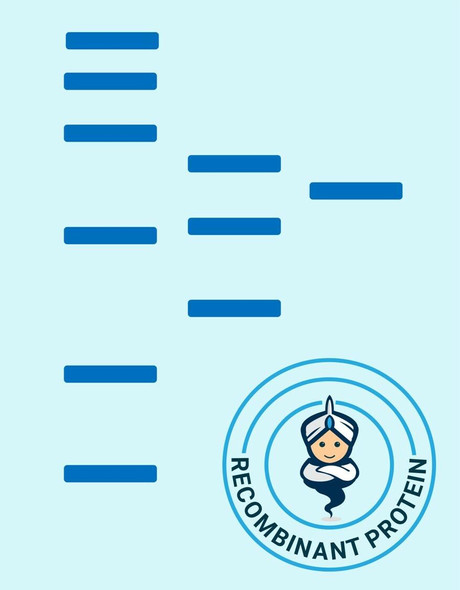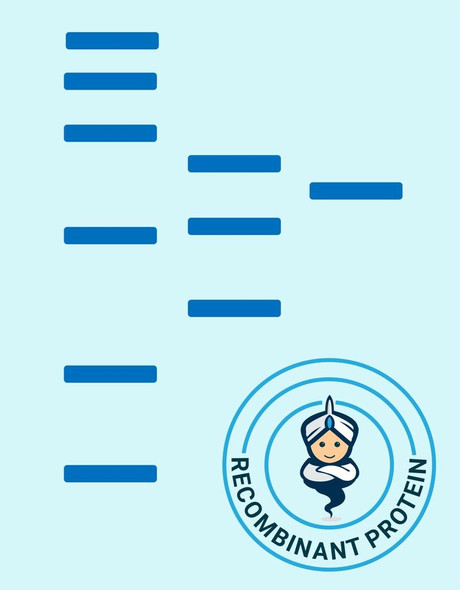Description
| Product Name: | Human ATG4B Recombinant Protein |
| Product Code: | RPPB2813 |
| Size: | 20µg |
| Species: | Human |
| Target: | ATG4B |
| Synonyms: | Cysteine protease ATG4B, AUT-like 1 cysteine endopeptidasem, Autophagin-1, Autophagy-related cysteine endopeptidase 1, Autophagy-related protein 4 homolog B, hAPG4B, ATG4B, APG4B, AUTL1, KIAA0943. |
| Source: | Escherichia Coli |
| Physical Appearance: | Sterile Filtered clear solution. |
| Formulation: | ATG4B protein solution (0.5mg/ml) containing 20mM Tris-HCl buffer (pH8.0), 20% glycerol, 1mM DTT and 0.1mM PMSF. |
| Stability: | Store at 4°C if entire vial will be used within 2-4 weeks. Store, frozen at -20°C for longer periods of time. For long term storage it is recommended to add a carrier protein (0.1% HSA or BSA).Avoid multiple freeze-thaw cycles. |
| Purity: | Greater than 90.0% as determined by SDS-PAGE. |
| Amino Acid Sequence: | MDAATLTYDT LRFAEFEDFP ETSEPVWILG RKYSIFTEKD EILSDVASRL WFTYRKNFPA IGGTGPTSDT GWGCMLRCGQ MIFAQALVCR HLGRDWRWTQ RKRQPDSYFS VLNAFIDRKD SYYSIHQIAQ MGVGEGKSIG QWYGPNTVAQ VLKKLAVFDT WSSLAVHIAM DNTVVMEEIR RLCRTSVPCA GATAFPADSD RHCNGFPAGA EVTNRPSPWR PLVLLIPLRL GLTDINEAYV ETLKHCFMMP QSLGVIGGKP NSAHYFIGYV GEELIYLDPH TTQPAVEPTD GCFIPDESFH CQHPPCRMSI AELDPSIAVG FFCKTEDDFN DWCQQVKKLS LLGGALPMFE LVEQQPSHLA CPDVLNLSLD SSDVERLERF FDSEDEDFEI LSLLEHHHHH H |
Cysteine protease ATG4B (ATG4B) belongs to the autophagin protein family. Autophagy is the manner by which endogenous proteins and damaged organelles are destroyed intracellularly. Autophagy is vital for cell homeostasis and cell remodeling during differentiation, metamorphosis, non-apoptotic cell death, and aging. ATG4B is a cysteine protease necessary for autophagy, which cleaves the C-terminal part of either MAP1LC3, GABARAPL2 or GABARAP, allowing the liberation of form I. A subpopulation of form I is then transformed to a smaller form (form II). Form II, with an exposed C-terminal glycine, is deemed to be the phosphatidylethanolamine (PE)-conjugated form, and is capable of binding to autophagosomes. Reduced levels of autophagy are seen in some malignant tumors; therefore autophagy may have a role in controlling the unregulated cell growth linked to cancer.
ATG4B Human Recombinant produced in E.Coli is a single, non-glycosylated polypeptide chain containing 401 amino acids (1-393 a.a.) and having a molecular mass of 45.4kDa.ATG4B is fused to an 8 amino acid His-tag at C-terminus & purified by proprietary chromatographic techniques.
| UniProt Protein Function: | ATG4B: Cysteine protease required for autophagy, which cleaves the C-terminal part of either MAP1LC3, GABARAPL2 or GABARAP, allowing the liberation of form I. A subpopulation of form I is subsequently converted to a smaller form (form II). Form II, with a revealed C-terminal glycine, is considered to be the phosphatidylethanolamine (PE)-conjugated form, and has the capacity for the binding to autophagosomes. Mainly expressed in the skeletal muscle, followed by brain, heart, liver and pancreas. Inhibited by N-ethylmaleimide. Belongs to the peptidase C54 family. 5 isoforms of the human protein are produced by alternative splicing. |
| UniProt Protein Details: | Protein type:EC 3.4.22.-; Autophagy; Protease; Ubiquitin conjugating system Chromosomal Location of Human Ortholog: 2q37.3 Cellular Component: cytoplasm; cytosol Molecular Function:cysteine-type endopeptidase activity; cysteine-type peptidase activity; endopeptidase activity; protein binding Biological Process: autophagic vacuole formation; autophagy; C-terminal protein lipidation; macroautophagy; mitochondrion degradation; protein delipidation; protein processing; protein targeting to membrane; proteolysis |
| NCBI Summary: | Autophagy is the process by which endogenous proteins and damaged organelles are destroyed intracellularly. Autophagy is postulated to be essential for cell homeostasis and cell remodeling during differentiation, metamorphosis, non-apoptotic cell death, and aging. Reduced levels of autophagy have been described in some malignant tumors, and a role for autophagy in controlling the unregulated cell growth linked to cancer has been proposed. This gene encodes a member of the autophagin protein family. The encoded protein is also designated as a member of the C-54 family of cysteine proteases. Alternate transcriptional splice variants, encoding different isoforms, have been characterized. [provided by RefSeq, Jul 2008] |
| UniProt Code: | Q9Y4P1 |
| NCBI GenInfo Identifier: | 296434400 |
| NCBI Gene ID: | 23192 |
| NCBI Accession: | Q9Y4P1.2 |
| UniProt Secondary Accession: | Q9Y4P1,Q53NU4, Q6ZUV8, Q8WYM9, Q96K07, Q96K96, Q96SZ1 Q9Y2F2, B7WNK2, |
| UniProt Related Accession: | Q9Y4P1 |
| Molecular Weight: | 42,622 Da |
| NCBI Full Name: | Cysteine protease ATG4B |
| NCBI Synonym Full Names: | autophagy related 4B cysteine peptidase |
| NCBI Official Symbol: | ATG4B�� |
| NCBI Official Synonym Symbols: | APG4B; AUTL1�� |
| NCBI Protein Information: | cysteine protease ATG4B |
| UniProt Protein Name: | Cysteine protease ATG4B |
| UniProt Synonym Protein Names: | AUT-like 1 cysteine endopeptidase; Autophagin-1; Autophagy-related cysteine endopeptidase 1; Autophagy-related protein 4 homolog B; hAPG4B |
| Protein Family: | Cysteine protease |
| UniProt Gene Name: | ATG4B�� |
| UniProt Entry Name: | ATG4B_HUMAN |






